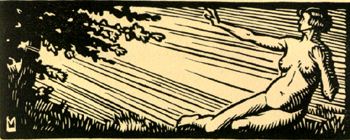


 OREMOST among the great men we have known, and whose friendship we have held most precious, come the names of Peter Kropotkin, William Morris, Elisée and Elie Reclus. They saw the world as it is today with all its injustice and cruelty, its want of harmony and beauty, but they never lost the vision of what the world might be, when humanity would rise in freedom to the moral and spiritual heights, which existing conditions now make unattainable.
OREMOST among the great men we have known, and whose friendship we have held most precious, come the names of Peter Kropotkin, William Morris, Elisée and Elie Reclus. They saw the world as it is today with all its injustice and cruelty, its want of harmony and beauty, but they never lost the vision of what the world might be, when humanity would rise in freedom to the moral and spiritual heights, which existing conditions now make unattainable.![]() It was through Kropotkin (and what better introduction could we have) that we first knew our friend Paul Reclus in England, by whom we later came to know his uncle and his father Elisée and Elie Reclus.
It was through Kropotkin (and what better introduction could we have) that we first knew our friend Paul Reclus in England, by whom we later came to know his uncle and his father Elisée and Elie Reclus.![]()
Elisée Reclus had the strength of character, the power of endurance and the vision of a Prophet of old. He came to us in London anxious to find support for the lately established New University at Brussels, but the idea which such a University represented, received little support in England where people are satisfied to continue on old conservative lines, leaving it for progressive thinkers to work alone on independent lines.![]() Elisée Reclus' sympathy extended to the animal world, and he was and remained a convinced and practicing vegetarian.
Elisée Reclus' sympathy extended to the animal world, and he was and remained a convinced and practicing vegetarian.

Elie Reclus and his wife we knew in Brussels, where they were living in 1895. They remain in my memory as a simple and noble couple, who had suffered much, but remained steadfast to their faith which nothing could change or weaken. Their home was simple like themselves, devoid of superfluous ornaments, or vulgar luxuries which gather round houses as a bourgeois inheritance - and all about them one felt the friendship of Books!![]() When I first called at their house I found Elie seated at a table sticking pictures into a scrap book which he had cut out of illustrated papers, pictures of the Earth and Man's life on it.
When I first called at their house I found Elie seated at a table sticking pictures into a scrap book which he had cut out of illustrated papers, pictures of the Earth and Man's life on it.![]() At once I felt drawn to him by the great sympathy he felt for the coloured races, and his faith in the future, also for his belief in the equality of men and women. In his wife he had a true companion, and he himself had the beautiful simplicity and sincerity which accompanies genius.
At once I felt drawn to him by the great sympathy he felt for the coloured races, and his faith in the future, also for his belief in the equality of men and women. In his wife he had a true companion, and he himself had the beautiful simplicity and sincerity which accompanies genius.![]()
Elisée and Elie Reclus wrote for me in the MS. book I had named I'Avenir, messages of friendship and Hope which I will now copy out and share with all who love and admire these two great Frenchmen.
The thought of the future has always given us strength and joy, even in the saddest days of apparent defeat. No suffering endures, no pain is bitter when one works or struggles for the happiness of those who will be born, and if the joy of fighting is great even when one is alone, how much more powerful is the feeling of enthusiasm when one associates his strength and intelligence at all times to the strength and intelligence of frends.
From friendship, to friendship we become immortal in the great struggle; be among us who dies lives again in one better than himself. Let us love one another steadfastly, then, in the incessant effort for the common cause.
| London on New Year's Eve. | ELISÉE RECLUS |

It was no longer winter, but it was not yet spring. One passed from squalls to showers; a sharp and cold wind whistled.
Under a fall of scarcely melted snow, the tufts of the rosebushes were shivering, leaves tiny and thin, of a pale green.
"It is raw", they dreamed, "it is cold, and we shiver, we are benumbed. But we will have sisters who will be born in the happy month of June, in the still merrier July.
"They will drink in the sunshine, they will aspire to it, they will respire it. They will be rose-petals in a fragrant corolla. We are no longer cold thinking of their happiness!"
ELIE RECLUS
2-VII-'95.
ANNE COBDEN-SANDERSON